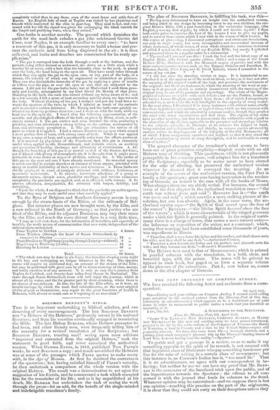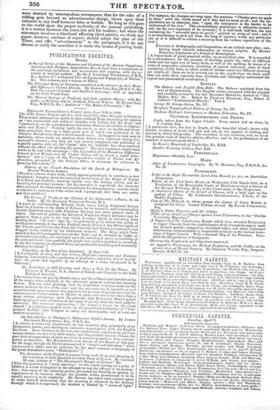THE Purl IMPUDENT OF COMPTON AUDLEY.
A SUBSCRIBER TO THE SPECTATOR. From the Morning Post, Gth April 1841. "LORD WE. LENNOX'S NEW ROMANCE, COMPTON AUDLEY, Or HANDS NOT DEARTS.= In this new and exciting story we have scenes introduced, painted to the life by the noble author, of the Congress of Vienna—the Battle of Waterloo, a tour in Canada and a visit to the United States—topics still possessing interest. We have also some town life—a borough election, and a jobbing joint-stock company's pleasure trip np the Thames—bearing traces of Lord Wm. Lennox having seen the reality.'—Spectator."
To garble and gut a passage in a review, so as to make it say something opposite to the spirit of its remark, is not unusual with that ingenious class of fabricators who pay something handsome per line for the sake of writing in a certain class of newspapers ; but this instance is, as COOPER'S Indian has it, " too much lie." That it is an advertisement, we agree with our correspondent in be- lieving; but neither he nor we can have any proof that Mr. BENT- LEY is the concocter of the barefaced trick upon the public, and of the impertinence towards the Spectator : the offence to all con- cerned is with the journal that lends its columns to the fraud. Whatever opinion may be entertained—and we suppose there is but one opinion—touching this practice on the part of the originators, it is clear that they could not carry on their deceptions unless they WE have received the following letter and enclosure from a corre- spondent.
6th April 1841.
SIR—Having read your critique on Compton Audley, I cannot avoid calling your attention to the enclosed extract from the Morning Post of this day, (obviously an advertisement,) which appears to be a fraudulent use of your name in order to recommend to public notice a work that you described as unworthy of it.
I am, Sir, &c.
were abetted by unscrupulous newspapers, that for the sake of a trifling gain beyond an advertisement-charge, throw open their columns to any stuff however false or foolish. So long as this goes to the world upon the proper authority of the journal publishing, it is a matter between the journalist and his readers ; but when the statement involves a falsehood affecting third parties, we think any paper, however careless of repute, should adopt the plan of the Times, and affix "advertisement " to the paragraph, if it do not choose to verify the assertion it is made the means of putting forth.



























 Previous page
Previous page